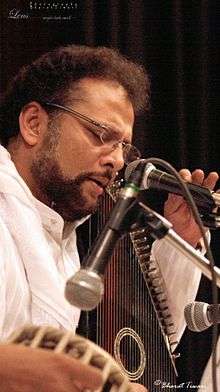Raza Ali Khan
| Raza Ali Khan | |
|---|---|
 Raza Ali Khan, performing | |
| Background information | |
| Born | 8 August 1962 |
| Origin | Kolkata, India |
| Genres | Hindustani classical music |
| Occupation(s) | Hindustani classical vocalist |
Ustad Raza Ali Khan (Devanagari:उस्ताद रज़ा अली खान) (born on 8 August 1962) is an Indian classical vocalist of the Kasur Patiala gharana.Raza is experienced at various genres of music beyond his gharana and is one of the few Indian classical vocalists to make successful pioneering ventures in performing with Western Classical Jazz musicians such as Louis Banks and others. He is also famed for his vocal Jugalbandi with Sitar maestro Shahid Parvez and Grammy Award winner Pandit Biswa Mohan Bhatt.
Personal life and education
Raza Ali Khan was born in Karachi, Pakistan to Hindustani classical vocalist Munawar Ali Khan, who was the son of Bade Ghulam Ali Khan.
Raza was first introduced to music by his grandfather amidst frolics. Bade Khan Sahab promised him toys and a few annas in his childhood to memorise Palta (patterns for practise) and Bandishes (short poems in various Ragas). However, watching his father (Munawar Ali) live was the defining moment that made Raza determined to follow the footsteps of his accomplished ancestors. After rigorous trainings and practice for years, Raza first delivered his impromptu solo performance at the Youth Festival in 1977 at the Eden Gardens, Kolkata at the age of 15.
Blessed with a uniquely charming and deep voice, Raza’s soul stirring behlawas (introductory phrases of a Raag), extremely mathematical yet spontaneous sargams and fluent taankari across three octaves, are proof of his consistent devotion to music and his relentless quest over the years as well as both his Ustad’s profound influences on him. His father Ustad Munwar Ali had Ustad Ahmad Jaan Thirakuwa, Ustad Vilayat Khan, Ustad Ali Akbar Khan, Pandit Ravi Shankar, Ustad Zakir Hussain and many other giants of Hindustaani Classical music regularly visiting him at his place. Hence, Raza grew up in an ambience that had music at its heart, discussions and culture.
At a very young age Raza joined the Bharatiya Kala Kendra in Delhi as an assistant teacher and worked alongside Pandit Birju Maharaj, Pandit Amarlal and other distinguished artistes. Simultaneously he received intensive experience in music arrangement associating with foremost music directors such as Salil Choudhury , Laxmikant Pyarelal and many other noted musicians from that period.
Raza’s first album Shadaab, a collection of Ghazals, was launched by Venus Worldwide Entertainment Pvt Ltd in 1984.The five Ghazals in the album were both sung and composed by Raza, who was barely 22 then.
Following the tradition of his forefathers, Raza has also proven to be a great mentor since his early days of teaching at his ancestral house in Kolkata. Adept at speaking in various languages, including Urdu, English, Persian, German and Bengali, Raza has been one of the most sought after Gurus in and outside his homeland. His scientific teaching technique stresses upon full throated singing with command over breathing, bereft of any kind of vocal and facial distortions. His methods have not only helped his disciples acquire full flair in their vocal range with a ‘Sudh Aakar’ but has also made them skilled at retaining the clarity of words even while singing higher notes. Raza was invited to conduct workshop at the University of Birmingham, Germany in 1999. He was also appointed as the Guru at the State Music Academy from 2013 to 2016 by the Government of West Bengal.
Career
Raza Ali performs Khayal, Thumri, Dadra, Ghazal, Geet, Sozkhani, Noha Khani, and Manqabat. Over the years, he has performed at various RadioSangeet Sammelans, both national and regional programmes of [Doordarshan]], Gwalior Sangeet Samarah, Dover Lane Music Conference, Kolkata and various other state conferences of music in West Bengal, Harballav Music Festival at Jullandar, Shriram Shankar Lal Festival in Delhi, Krishna Gana Sabha in Chennai, Festival at Nehru Centre of Performing Arts in Mumbai, Quilla Mubarak Festival, Patiala Festival, Alauddin Khan Festival, Maihar Festival, Triveni Kala Sangam, Chandigarh and many other major classical music conferences around the country.
He has also graced the 24 hour music festival of India (The Millenium Show) at the Cartoucherie de Vincennes in Paris, the Zurich and Basil Festival in Switzerland (1987), music conference at Nehru Centre in London (1999), the Sadarang Music Festival at the Queen Elizabeth Hall in London (1999) and All Pakistan Music Conference (2005) with an array of enchanting performances. Besides, he has extensively toured in Canada, Australia and all the Middle Eastern countries to perform Sozkhani and Noha in which he is extremely popular around the world.
He has composed Ghazals for Ghulam Ali which were released by Venus, Moods and Emotions and for Penaz Masani which was released by Polydor, 'Dharkan'. He remained the chief music director of Venus for four years. He also gave music in a Telefilm named Bindia which was produced by Doordarshan and was directed by Uma Vasudeva.
Discography
- Gharana Lineage (NAVRAS Records, London)
- 3 Generations (Gathani Records, Calcutta)
- A Tribute to Ustad Bade Ghulam Ali Khan, (Audio Rec, London)
- Homage to Ustad Bade Ghulam Ali Khan, Raagleela and Shadab released from Venus
- Ustad Raza Ali Khan live in Karachi released by APMC.
- Shadaab, a collection of Ghazals ( Venus Worldwide Entertainment Pvt Ltd)
Awards
- Master of Khayal award from the Indira Gandhi National Centre for the Arts
- Tehzeeb award by the Tehzeeb Foundation of Karachi in 2017
- Girija Shankar award by the Government of West Bengal in 2018
References
1. https://www.deccanchronicle.com/entertainment/music/130217/legacy-comes-with-pressure-and-talent-ustad-raza-ali-khan.html 2. https://www.cinestaan.com/articles/2018/apr/24/12745/bade-ghulam-ali-khan-the-only-one-who-could-be-tansen-s-voice-for-mughal-e-azam
3. http://mio.to/album/Ghulam+Ali/Moods+%26+Emotions+%281992%29